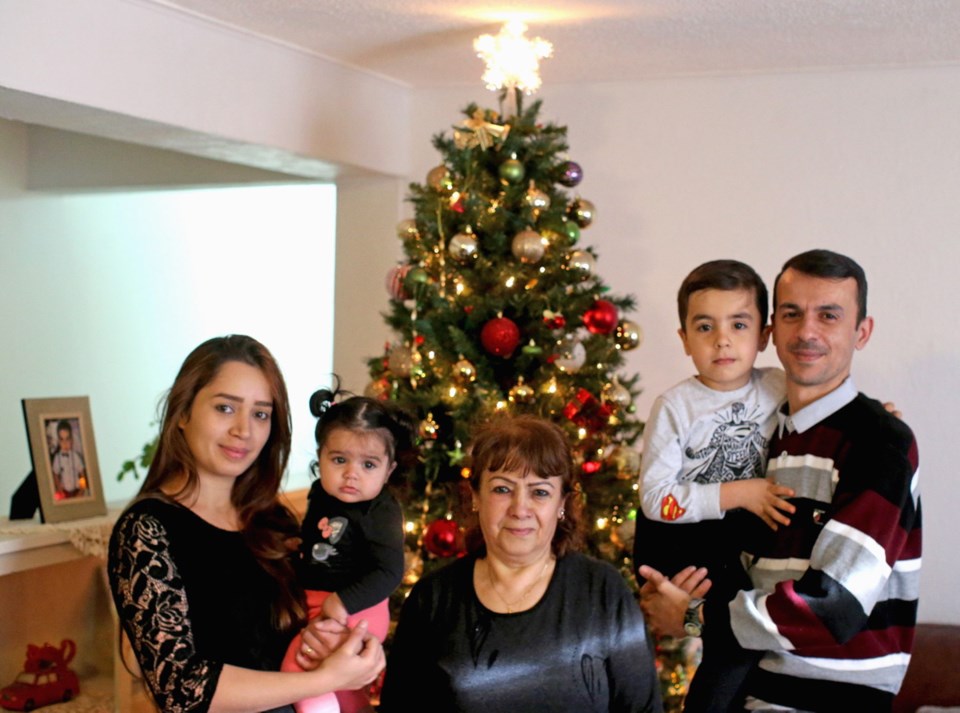 The Kalyana family’s first Canadian Christmas tree is a big one, the star at the top touching the ceiling of their Oak Bay apartment.
The Kalyana family’s first Canadian Christmas tree is a big one, the star at the top touching the ceiling of their Oak Bay apartment.
Julyan, the dad, says they used to have Christmas trees back in Iraq, too, but stopped erecting them around 2006. It identified them as Christian, and therefore a target for the sectarian violence gripping the country. “It was dangerous to make a Christmas tree in your house.”
Even as he says this, the smile doesn’t leave his face. The 38-year-old is one of the most genuinely happy souls you will ever meet.
Or maybe he has just been that way since he and his family — mother Alovia, wife Nanh, four-year-old Mathyos and eight-month-old Mira — landed in Victoria in October after four years as refugees.
You might recall them from a column in June, when their church-based Victoria sponsors were frustrated by how long it was taking to bring Julyan’s family, as well as that of his brother, Martin, here from Turkey, where all nine of them were crammed in one apartment.
They had fled persecution in Iraq, where the Christian minority has been under the gun since the mid-2000s, when civil strife followed the war that toppled Saddam Hussein. “Especially, when the United States army left Iraq, it started to be more difficult,” Julyan says.
The troubles reached the Kalyanas one day when hard-eyed men from one of Iraq’s warring militias came to their home and threatened their father with death if they didn’t leave town within 24 hours. When the brothers complained to the police, they were told: “We can’t protect ourselves, how can we protect your family?”
The family moved, but it didn’t save their father; in 2011, after being confronted by militia members in a market, he took a few steps, collapsed and then died in hospital.
The family moved to Kirkuk, an oil city with heavy security. It still wasn’t safe. A friend was blown up by a bomb placed under his car. They knew others who were killed, too. Sometimes militants would wait for mourners to gather, then target them as well.
In 2014, with ISIS forces drawing near, extremists grew emboldened. One day a stranger called Julyan’s phone: “We have a fatwah on you and your brother.” If they couldn’t kill the brothers, the voice said, they would get their families. Julyan figures the caller got his phone number from someone at work, someone selling him out to save his own skin.
The family — Mathyos had just been born — fled to Turkey and a life in stateless limbo. They weren’t allowed work permits, though Julyan found an under-the-table job fixing computers for Arabic-speaking customers.
Hope came in 2016 when word came that two Victoria Roman Catholic parishes, Holy Cross and St. Joseph the Worker, would sponsor Martin, his wife and two children, while another, St. Patrick’s, would combine with Victoria’s Francisan friary to sponsor Julyan’s family.
The approval process felt interminable, though. The silver lining was that it gave Julyan time to learn English. Four evenings a week he would Skype with his Victoria tutors, Sister Sheila Moss and Jane Huijsmans. (“They are like a new family to me,” he now says.) After 2 1Ú2 years of that, his language skills are pretty good.
So is the rest of life. The Kalyanas — both brothers and their families came in October — knew they would have friends in people like Moss and Huijsmans, but worried about how other Canadians would accept them.
It turned out not to be a problem. Victorians swept them up, embraced them, from the get-go.
Strangers show up at the door, offering to help.
Someone is always pulling them into another corner of local life. They have been to Halloween on Oak Bay Avenue, Remembrance Day at the legislature, Beacon Hill Park, the lighted truck parade, Willows Beach to watch the sail past. The choir singing the Messiah at UVic on Sunday? “It takes you to another world,” Julyan says. So did the fishing boat from which he marvelled at Race Rocks’ lighthouse and sea lions. Nanh’s eyes light up at the memory of the teddy bear toss at a Royals game last week.
Julyan and his mother have been studying at the Inter-Cultural Association five days a week. Nanh takes care of the kids during the day, but attends twice-a-week night classes. She and her mother-in-law will swap routines in a few months.
Julyan is registered for advanced English classes at Camosun College in January. Then he hopes to get computer credentials. He wants to work, to reward the faith his sponsors have put in him, as soon as he can.
It’s all such a long way from death threats in Iraq, from that Turkish purgatory. When your days are so black, you can’t imagine them getting more than a little brighter, Julyan says. “You want a little bit better life.” The reality has exceeded their dreams. “The first month, my mom kept asking: ‘Are we really in Canada?’ ”
Yes, they are, and they know what that means.
“It saved my life,” Julyan says. “It’s a new life for me and my family. It’s a future for my children. …It’s like a gift.”
Nanh, too, speaks of the relief of knowing their children can grow up safe, secure. Their gratitude for those who brought them here is profound.
They’ll spend Christmas as a family, in a home with a tree.



